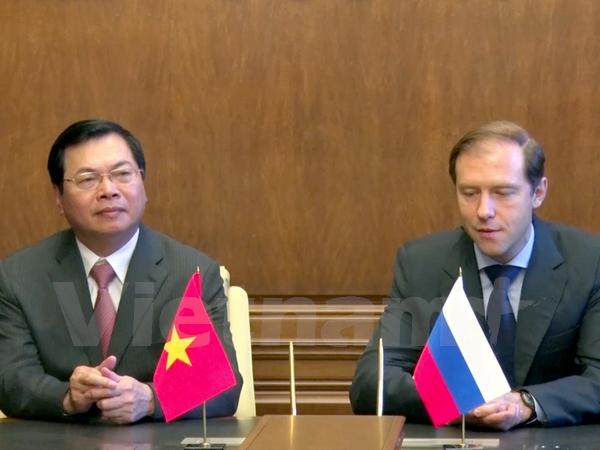Auto joint ventures formed by Vietnamese and Russian firms will be granted a number of incentives but will lose their licenses if they fail to meet local-content requirements.

Minister of Industry and Trade Vu Huy Hoang (L) and and his Russian counterpart Denis Manturov (Source: VNA)
The condition is specified in a protocol on the auto industry clinched by the governments of Vietnam and Russia on March 21. The protocol clarifies commitments under the free trade agreement (FTA) between Vietnam and the Eurasia Economic Union (EAEU).
The protocol was signed by Vietnam’s Minister of Industry and Trade Vu Huy Hoang and his Russian counterpart Denis Valentinovich Manturov, according to the ministry.
Based on priority investment projects under the FTA between Vietnam and EAEU, the two sides negotiated to offer incentives to those auto joint ventures.
According to the protocol, Russian auto firms like KAMAZ, GAZ and UAZ will tie up with Vietnamese partners to set up joint ventures to manufacture and assemble trucks, vehicles of 10 seats or above, terrain vehicles and some specialized vehicles in Vietnam.
Joint ventures will be exempted from import tariffs on some completely built-up (CBU) vehicles when selling their products in Vietnam to evaluate market demand. In addition, Vietnam will give duty-free quotas to auto parts in the first five years before such tariffs in the Vietnam-EAEU FTA are cut to 0%.
However, the local content ratios of special-purpose vehicles, trucks and terrain vehicles, and over-ten-seat autos must reach 25%, 30% and 35% in 2020 respectively. Such proportions will have to rise to 40%, 45% and 50% in 2025.
If joint ventures do not meet the ratios of local content after 10 years, their operation licenses would be withdrawn.
They must prepare specific plans to transfer technology, develop auto maintenance and repair systems, train Vietnamese technicians and support auto and parts exports to other nations, including EAEU member states. Joint ventures will be helped to trade vehicles and parts they manufacture in ASEAN markets.
According to the ministry, the protocol will become effective at the same time with the Vietnam-EAEU FTA in the middle of 2016.
| related news |